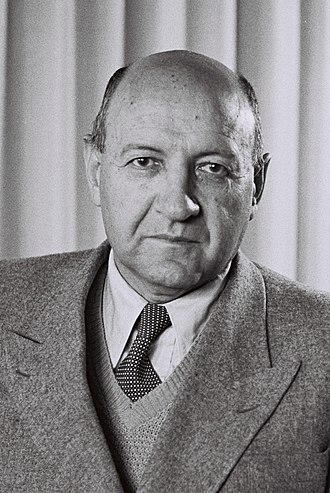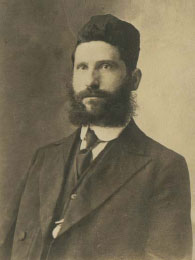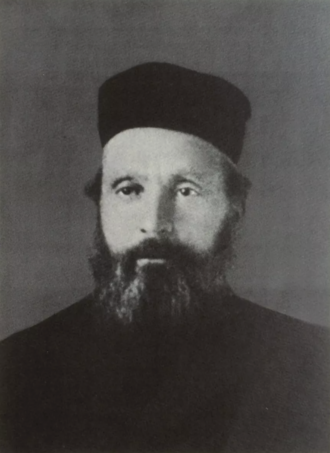Discover Your Roots
SIGN UPDiscover Your Roots
SIGN UPEliezer is a male name of Hebrew origin, meaning "My God Has Helped." It was the name of several individuals in the Hebrew Bible, including the head of Abraham's household, the son of Moses, and a prophet who rebuked King Jehoshaphat of Judah. The name is rooted in the concept of divine assistance and support, reflecting a strong connection to faith and spirituality. Its significance is deeply embedded in biblical narratives, symbolizing the belief in God's guidance and aid in times of need. The diverse historical and religious associations of the name Eliezer demonstrate its enduring relevance and spiritual resonance.

Eliezer Kaplan (1891-1952) was a prominent Zionist activist and Israeli politician. He played a crucial role in Israel's early years, serving as one of the signatories of the Israeli declaration of independence and the country's first Minister of Finance and Deputy Prime Minister. Born in Minsk, he was deeply involved in Zionist activities from a young age and later immigrated to Mandatory Palestine. Kaplan's contributions to the development of Israel were diverse, including serving on the Tel Aviv city council and the board of the Jewish Agency for Israel. Notably, he signed the Israeli declaration of independence and held key ministerial positions in the provisional government. His legacy is honored through various landmarks and awards named after him, such as the Kaplan Medical Center in Rehovot and the Kaplan Prize for productivity. Eliezer Kaplan's impact on Israel's early political and economic landscape remains significant, and his memory is preserved through these commemorations.

Eliezer Silver (Hebrew: אליעזר סילבר; February 15, 1882 - February 7, 1968) was a prominent religious leader in American Jewry and served as the President of the Union of Orthodox Rabbis of the U.S. and Canada. Born in Obeliai, Lithuania, Silver descended from a long line of rabbis and received Semicha from Rabbi Chaim Ozer Grodzinski in 1906. He immigrated to the United States in 1907 and held various Rabbinical positions in New York, Pennsylvania, Massachusetts, and Ohio. Silver was deeply involved in relief efforts during World War I and played a crucial role in rescuing European Torah scholars from Nazi Europe during World War II. He spearheaded fundraising drives and secured emergency visas, ultimately saving thousands of lives. He was also a pivotal founder and president of Agudath Israel of America. After the war, Silver founded the Chofetz Chaim Day School and continued his influential leadership until his passing in 1968. His legacy lives on through his notable students, including Rabbi Shlomo Wahrman. Silver's dedication to helping others and his love for his fellow Jews left a lasting impact on the Jewish community.

Rabbi Eliezer Gordon, also known as Reb Laizer Telzer, was a prominent figure in the Jewish community during the late 19th and early 20th centuries. Born in 1841 in Belarus, he went on to become the rabbi and rosh yeshiva of Telz, Lithuania. His early education in prestigious yeshivas and his association with renowned scholars shaped his approach to education and leadership. In 1883, he became the rabbi of Telz and subsequently led the yeshiva, implementing innovative educational methods that are still influential today. Gordon emphasized a comprehensive study of Talmudic literature, integrating both early and later commentaries and promoting the study of musar literature. He also prioritized the appointment of high-quality teachers, contributing to the yeshiva's success. Aside from his educational contributions, Gordon was actively involved in communal activities, advocating for ethical business practices and expressing strong opposition to Zionism. Despite facing challenges, such as a devastating fire in Telz, he remained dedicated to the welfare of the community. Tragically, Gordon passed away in 1910 after traveling to Europe to raise funds for the rebuilding of Telz. His enduring legacy continues to inspire and influence Jewish education and communal values.

Eliezer Zusia Portugal, also known as the Skulener Rebbe, was a revered figure in the Jewish community, known for his warmth, compassion, and dedication to preserving Jewish heritage. Born in 1898, he became the first Rebbe of Skulen and made a profound impact in Russia, Romania, Israel, and the United States. Despite assuming the role of a Hasidic Rebbe later in life, his influence was far-reaching. Notably, he adopted and cared for hundreds of Jewish youth and war orphans, establishing an orphanage in Bucharest, Romania. Imprisoned by the Communist government of Romania in 1959, he and his son were eventually freed and immigrated to the United States, where he continued his efforts to help the underprivileged. Portugal's legacy includes the establishment of the Skulener dynasty in America, the inauguration of a network of schools called Chesed L'Avrohom, and his advocacy for the release of Jews from communist countries. He passed away in 1982, leaving behind a rich musical and literary heritage. His impact and teachings continue to resonate within the Jewish community, symbolizing a legacy of compassion, resilience, and unwavering faith.

Eliezer Jewett, born on August 31, 1731, in Norwich, Connecticut, was a prominent figure in the founding of Jewett City, Connecticut, now part of the town of Griswold. Despite not having a formal education or exceptional mental abilities, he was described as an active, persevering, and kind-hearted individual who dedicated himself to opening paths of enterprise for the benefit of others. In 1771, Jewett established a settlement in the area, where he built saw, grist, and fulling mills, a tavern, and an irrigation plant, harnessing the water power of the Pachaug River. Notably, he was joined by John Wilson, an English clothier, in the area, who further contributed to its development. Jewett City was officially named in 1895, and Eliezer Jewett's legacy is commemorated by a monument in the local graveyard. He had seven children and left a lasting impact on the community, with his descendants making significant contributions to various fields, including law and social reform. Eliezer Jewett passed away on December 7, 1817, leaving behind a thriving village that owed much of its prosperity to his industrious and benevolent nature.
All images displayed on this page are sourced from Wikipedia or Wikimedia Commons.We use these images under their respective Creative Commons or public domain licenses. Wherever applicable, author attributions and license information are provided. If you believe an image is used incorrectly or outside its license terms, please contact us so that we can review and correct the issue.